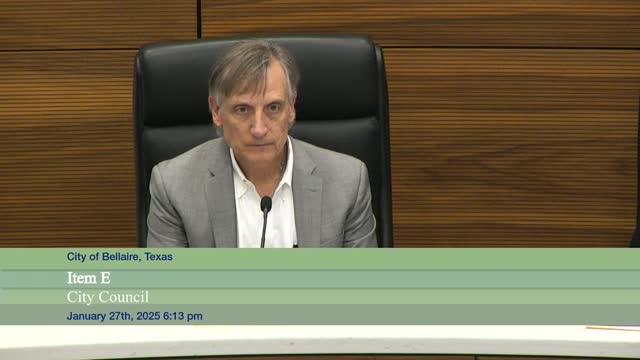Council OKs $26,400 HDR work order to tighten cost estimates for wastewater options
Get AI-powered insights, summaries, and transcripts
Subscribe
Summary
Bellaire City Council authorized a $26,400 work order with HDR to refine cost estimates for replacing or upgrading the city's wastewater treatment plant, after public comment urged an independent review; Councilmember Gordon recused and the measure passed 6-0.
The Bellaire City Council on Jan. 27 authorized a $26,400 contract amendment with engineering firm HDR Inc. to refine and narrow cost estimates for options related to the city's wastewater treatment plant and related lift-station work.
The action followed public comment urging independent review and a council discussion about the level of detail needed before any long-term decision. The vote passed 6-0; Councilmember David Gordon recused himself because of an unrelated business relationship with HDR.
Why it matters: Council has been weighing whether to repair and modernize the existing plant, rebuild a smaller or different-capacity plant, or decommission the facility and send Bellaire's wastewater to a neighboring system. More precise cost estimates will be used to compare alternatives and inform future budget and policy choices.
The new work order directs HDR to produce tighter Class C estimates for a lowest-cost replacement plant (the staff direction was to model a roughly 2.5 million gallons-per-day baseline), firm up preliminary costs for lift stations and force mains if the city elects to decommission the plant and send flows to the Houston system, and to analyze feasibility and costs for siting a new plant on the city's public works laydown yard across the street from the existing facility. Beth Jones, Bellaire assistant city manager and the city engineer, told council the $26,400 amendment is intended to pull specific "levers" in prior HDR analyses so council has clearer, value-engineered numbers.
Public comment had flagged the city's procurement and oversight practices. Dan Sylvester, a longtime Bellaire resident who identified himself as experienced in engineering, urged the council to obtain an independent second opinion rather than rely only on the firm that produced the original report. "You ought to have an independent review of a second party, not the same firm that did the first one," Sylvester said during public comments, arguing that an independent review could have prevented mistakes on other large projects.
Jones reminded council that HDR was selected through a public request-for-qualifications process and that work order one's condition assessment and related studies cost about $285,000 to date. She said the proposed $26,400 work order is narrowly targeted to sharpen the numbers for council deliberations; moving to a full design-level estimate would be substantially more expensive. Jones stressed the work order would produce the least-expensive replacement estimate unless council instructs staff to evaluate higher-performance treatment options.
Council members emphasized the need for better data before making an irreversible long-term decision. Mayor Pro Tem Frazier, Councilmembers Taylor and Witt and others said they supported the additional study to give future votes better factual grounding. Gordon disclosed his professional relationship with HDR and recused himself from the vote; the motion passed 6-0.
Next steps: HDR will return with the tighter estimates and feasibility findings for council review. Council members said they expect the supplemental analysis to inform budget planning, potential grant discussions and any later public outreach about a future decision.
